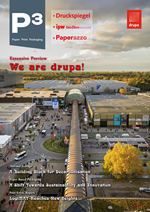P3 - NEWS
Two South African young engineers to progress to global round of Blue Sky Awards
Two young South African researchers have won the local segment of the global Blue Sky Awards, and will now progress to competing against 12 international peers from seven countries. Qiniso Ngiba, a chemical engineer by training, and currently a junior research engineer at paper and packaging manufacturer Mpact, and Leane Naude, who is currently completing her MSc in chemical engineering at North West University and working at Sappi, are the two South African winners.
The Blue Sky Young Researchers Innovation Award is an biennial competition for students and young researchers who are focused on forest-based science, such as transforming wood-based raw materials into novel products, improving forestry techniques or pulping processes or contributing to the forest bio-economy. The programme is sponsored at a global level by the International Council of Forest and Paper Associations (ICFPA) and locally in South Africa by the Paper Manufacturers Association of South Africa (PAMSA). This year’s theme is “Building a Lower Carbon Economy with Climate Positive Forestry and Forest Products”.
Entrants had to submit proposals of their research projects for the awards. Ngiba’s project synthesised artificial humus by using the spent pulp lignin from the pulping and papermaking process, and tested these products in a plant trial. The synthesis of artificial humus increases carbon storage in soils, was shown to improve crop productivity, and provides a commercial route for spent pulp liquor. This is vital in achieving a lower carbon economy, increasing agricultural production and supporting the sector’s goal of a circular bio-economy.
Naude’s research has developed a more cost-effective purification method for lignosulphonate, an alternative to fossil-based products. Considered a biopolymer, lignosulphonate is a by-product from the sulphite pulping of wood into pulp for the production of high strength paper grades. The brown odourless powder is often used as a dispersant in pesticides, dyes, and other insoluble solids and liquids into water, and as a dust suppressant owing to its binding properties. The more cost effective purification process turns a low-value waste product into a high end resource that will support the journey towards a circular bio-economy.
Ngiba and Naude have participated in PAMSA’s Master of Engineering Bursary Programme, an initiative that enables BSc chemical engineering students to further their studies by carrying out their Masters studies with a pulp or paper manufacturing company.
“Both projects tap into the role of the forestry, pulp and paper industry in the journey towards climate change mitigation and the circular bio-economy,” commented Jane Molony, PAMSA executive director.
PAMSA will award Ngiba and Naude with R15,000 and R10,000 respectively.
Three of the 14 candidates will receive cash prizes and the opportunity to present their work to ICFPA’s Global CEO Roundtable discussion being held in early 2023. A judging panel has been assembled to assess the strength and potential of each entry:
- Dr Lyndall Bull, forestry officer at the Food and Agriculture Organisation of the United Nations (UN).
- Barbara Tavora Jainchill, programme management officer, Forest Affairs, with the UN Forum on Forests Secretariat.
- Kirsten Vice, vice president, Sustainability and Canadian Operations, National Council for Air and Stream Improvement (NCASI).








